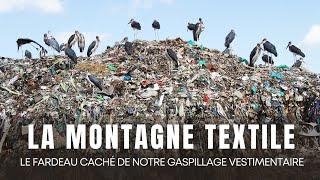By akademiotoelektronik, 03/05/2022
Loi Agec: how fashion is trying to stick to the anti-waste trend
In Kenya, mountains of clothes are piling up in open dumps. They illustrate the huge waste of unsold items in the fashion world – not to mention the pollution generated by this industry. In France alone, unsold clothes and shoes represented a market value of 1.6 billion euros in 2019, according to a study by Ademe dating from 2021. But since January 1, the anti-waste law for a circular economy, known as Agec, prohibits the destruction of unsold non-food items. In the event of non-compliance, the company risks a lot. It not only incurs a fine of up to 15,000 euros, but also to see its brand image tarnished.
"The solution is first to produce better"
Some brands have started to tackle the problem head-on, such as Camaïeu. The women's ready-to-wear chain has indeed decided to relocate part of the manufacture of its clothing to Europe and the Maghreb to quickly adjust the series while it takes three months with Asia. "Our stock is thus more limited", underlines its vice-president Samuel Alimi. Indeed, "the solution is first of all to produce better", confirms Yohann Petiot, managing director of the Alliance du Commerce. At the Mulliez, this transformation, which began in 2018, is already bearing fruit. Its men's ready-to-wear brand Jules is thus pleased to have produced 1.5 million fewer garments last year thanks to a better match between supply and demand. “We want to stop the race for promotions,” explains Clémence Berlier, its CSR manager.
In order to produce better, brands can also rely on certain IT tools. Like the Heuritech platform, which provides predictions of market and product trends from data collected on social networks using artificial intelligence. "This makes it possible to manage product launches with less uncertainty and more precision", underlines Julie Pont, fashion & creative director at Heuritech. “Ultimately, we are convinced that thanks to more refined and rational management, this will make it possible to reduce stocks”.

Read alsoWaste: what happens to unsold items that can no longer be destroyed?
A recycling sector to be structured
If the sales still allow unsold products to be sold but with low margins, other solutions exist such as destocking, second hand or even solidarity donations and recycling. “A sector which remains to be structured in France”, regrets Emmanuel Le Roch, general delegate of Procos. "The electronics sector is better structured, we must speed up the recycling sectors". This is attested by Yohann Petiot of the Alliance du Commerce. "Recycling practices are already anchored with certain actors, but the challenge for associations and to be able to process all stocks, it will certainly have to amplify their actions".
Without waiting, young brands are sketching out new avenues. Like Asphalt, which solved the problem of overproduction thanks to pre-ordering. At the end of the year, he only has a hundred pieces left in stock, for 200,000 sold. This stock is then sold at a higher price on the brand's website "to encourage customers to buy pre-orders next time", or simply offered to customers. Launched in 2016 by William Hauvette, the Asphalte brand now has 120,000 customers and generated 21 million in sales for the year 2021.
The essential remains to be done
After 20 years as a fashion buyer, Sandy Bontout has found another way to breathe new life into her clothes. In 2021, she and her cousin launched the Etablissements Bonnet platform, which offers a cleaning service for leather parts, for prices ranging from 39 euros for Stan Smiths to 130 euros for a coat. Today, the young entrepreneur is strongly solicited by brands to establish partnerships with them. "Durability is also maintenance, we are part of the solutions for products to last longer," she says.
If the Agec law can be considered a small victory, the essential remains to be done. According to Guillaume Declair, co-founder of the sustainable textile brand Loom, "we must focus on the volumes sold which are constantly increasing". Some 2.4 billion pieces of clothing, household linen and shoes were indeed put up for sale on the French market in 2020, according to ReFashion, the eco-organization of the sector, the equivalent of 7.7 kilograms per inhabitant. The weight of unreason?
Related Articles